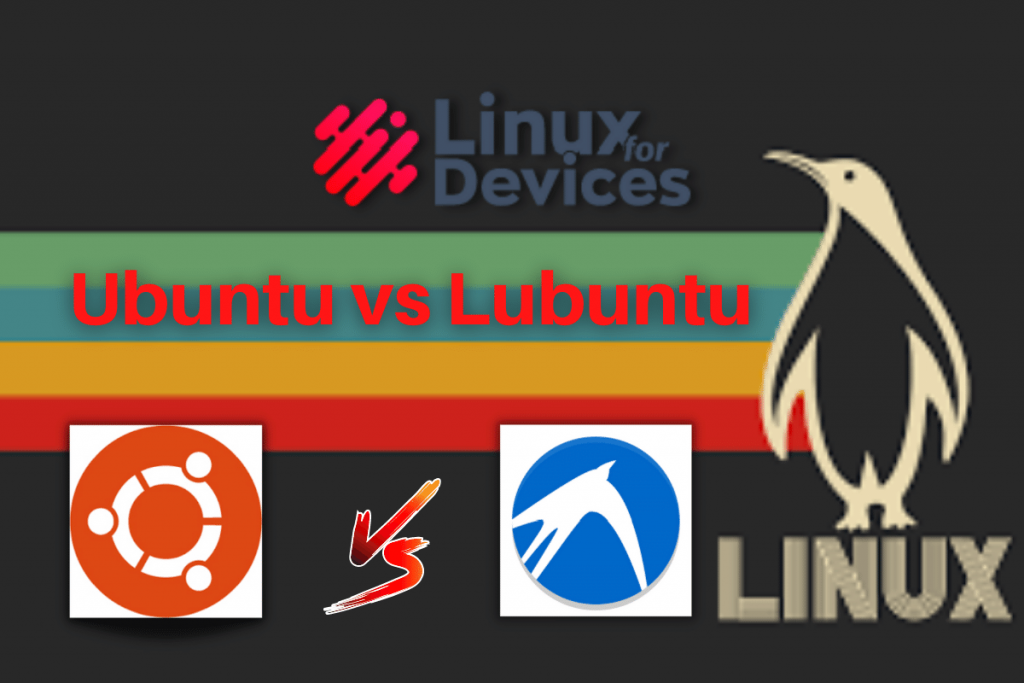Hello folks! In this tutorial, we are going to discuss the differences and similarities between two popular Linux distributions- Ubuntu vs Lubuntu. Both are different flavors of Ubuntu along with others such as Kubuntu or Xubuntu with different Desktop environments such as KDE, XFCE, GNOME or LXDE. So, Let’s get started!
Ubuntu vs Lubuntu – A Quick Overview
Although Ubuntu and Lubuntu both are the flavors of the Linux operating system which share the same repositories and core system components, there are some key differences between them. Here is the list of some key differences between Ubuntu and Lubuntu.
| Ubuntu | Lubuntu |
|---|---|
| A full-fledged Linux distribution. | A lightweight flavor or derivative of Ubuntu. |
| Uses GNOME 3 Desktop Environment. | Uses LXDE or LXQt Desktop Environment. |
| Visually more appealing than Lubuntu. | Visually less appealing than Ubuntu. |
| Requires more system resources to run. | Requires fewer system resources to run. |
| Can be used as a server operating system. | Can be used to revive old computers. |
| Closely resembles the modern Windows 10. | Resembles the older Windows XP. |
| Has an exceptionally large and active user base. | It has a relatively small and less active user base. |
Ubuntu vs Lubuntu – Comparing the individual use-cases
Let’s now compare the individual features of both Ubuntu and Lubuntu here.
1. Resource usage
Ubuntu and Lubuntu are built on the Ubuntu Linux base. But Ubuntu is a full-fledged mainstream Linux distribution that is available for community use. It is suitable for both desktops and servers.
On the other hand, Lubuntu is a lightweight derivative of Ubuntu, and it is great for systems with low specification, hence it can be used to revive old computers. Ubuntu and Lubuntu both can be used on the IoT (Internet of Things) boards to drive the IoT devices.
2. Availability on Cloud Platforms
Ubuntu also provides optimized and certified server images on popular cloud platforms like AWS, Azure, GCP, etc., along with its desktop version. Unlike Ubuntu, Lubuntu is only available for desktops environments and not for the various cloud servers.
3. Ease of Setup
We can download any version of Ubuntu from ubuntu.com while Lubuntu can be downloaded from lubuntu.me (official website of Lubuntu). Ubuntu and Lubuntu both provide an ISO image file for booting up the desktop environments and follow an almost similar installation procedure.
4. Basic system requirements
Ubuntu imposes minimum system requirements like a dual-core CPU with a minimum speed of 2 GHz, 2 GB of RAM, 25 GB of Hard Disk space, and a VGA-supported graphics card with a minimal resolution of 1024 x 768 pixels. While Lubuntu does not impose such high system requirements as it can run well on a system with 266 MHz processor, 128 MB of RAM, 3 GB of Hard Disk space, and a simple graphics card.
5. Desktop environment
Ubuntu’s Desktop Environment, GNOME 40+ uses a modern approach in its user interface design and provides various features like a virtual desktop manager, multipurpose top menu bar, vertical application switcher, etc. On the other hand, Lubuntu uses LXDE as its desktop environment which is open-source and widely known for its low system requirements with lightweight alternative applications like the LXTerminal (a terminal emulator), LXPannel (desktop pannel), LXAppearance (GTK and theme switcher), etc.
6. User Interface
Ubuntu’s desktop environment is visually more appealing than Lubuntu as it heavily relies on animations and other visual effects, which enhances the user experience to a great extent. That is why Gnome 40 works great on HD screens, while Lubuntu’s DE (LXDE) faces great difficulty to provide a smooth experience on HD screens.
NOTE: The recent updates have shown improvement in every kind of Desktop Environment.
7. Community support
We can easily get help/support for anything related to Ubuntu from its worldwide community forums (ubuntuforums.org) and (askubuntu.com) while it is difficult to get the same kind of quick support/help for Lubuntu related stuff, although there is a community forum for Lubuntu as well (lubuntu.me/tag/forum).
However, we’d consider this part as a tie between both the distros. The reason being that if you need any support with Lubuntu issues, the same can be solved by asking the Ubuntu community. While the dedicated community may be lacking, all Debian and Ubuntu-based distros have immense communities who are ready to help.
8. Updates & release cycles
The regular Ubuntu and Lubuntu both are released in LTS (Long-term Support) version every two even years, along with their regular releases. Whenever the latest version/updates of Ubuntu are released, a corresponding update/version of Lubuntu is also released like:
- Ubuntu 21.04 (Hirsute Hippo) ⇾ Lubuntu 21.04 (Hirsute Hippo)
- Ubuntu 20.10 (Groovy Gorilla) ⇾ Lubuntu 20.10 (Groovy Gorilla)
- Ubuntu 20.04.2 LTS (Focal Fossa) ⇾ Lubuntu 20.04.2 LTS (Focal Fossa)
Summing-up
In this tutorial, we have learned the difference and comparison between Lubuntu and Ubuntu operating system. Both the distributions are basically the same if you are looking at the back end. Both OS essentially have the same packages, same web browsers, the same good old Firefox, pre-installed LibreOffice etc. So ultimately it comes down to the Desktop you need as well as the system resources you have on your PC. If it is some old hardware, you should pick Ubuntu Mate or Lubuntu otherwise just pick the standard Ubuntu ISO without giving a second thought.
Hope the above discussion has cleared your confusion regarding the two Linux distributions- Ubuntu and Lubuntu. Stay tuned with us!
